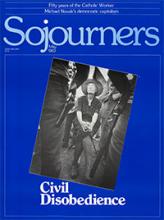Our children, 7 and 9 years old then, were spending three weeks of their summer vacation with my parents in New York, attending a day camp there. One day the other children at the camp were talking about what their parents were doing for the summer. Some had parents who were vacationing in Europe; others had different stories to tell.
When our children were asked where their mom and dad were, their reply was, "In jail." Many of their new friends were shocked, but it did not seem to upset our children. They had grown up amid the civil rights and peace struggles of the 1960s and 1970s. For them, this was not such an unusual statement.
However, having parents who periodically feel called to civil disobedience does have its effects on children. Jail, portrayed so gruesomely on television, may seem a fearsome place where parents could be hurt. And what about the children themselves when parents can't come running home in an emergency? They must live with the question of what will happen to them if they get sick and need their parents. And children are not the only ones involved when one feels called to do civil disobedience. There are one's spouse, parents, siblings, and friends, as well as one's employer.
Over the past 24 years of working for peace and being part of a family, I have learned many things. I still feel committed to civil disobedience as one option for change but feel that it is not something to be undertaken lightly: too many other people are involved in the consequences of the decision.
During the early years of my marriage, I felt caught between my desire to participate in actions that required civil disobedience and my definition of the role of "mother." This pull led to conflicts within me and between me and my friends who were not tied down by responsibilities to children and home.
Read the Full Article

